Drop the Fat: With Liver Power
Drop the Fat:
With Liver Power
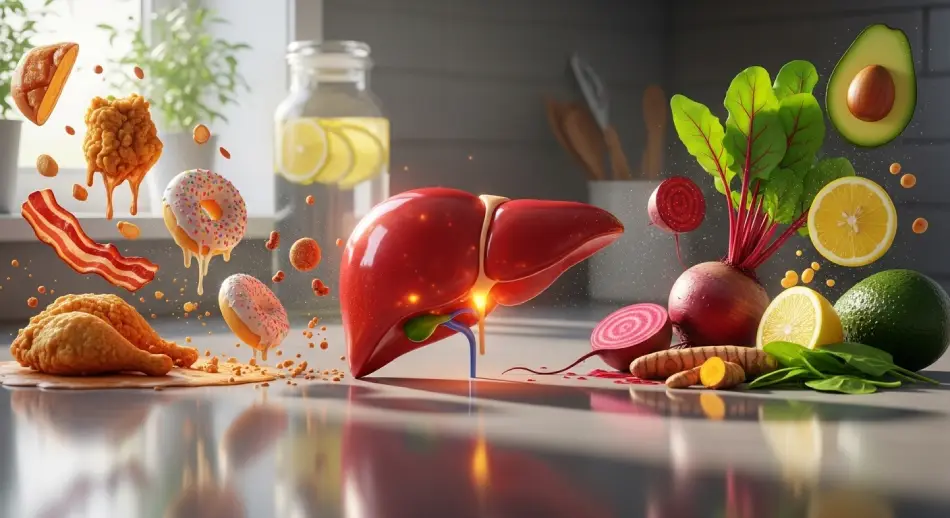
🧠 Getting to Know Your Liver and Why It Matters
Picture this. Inside your body, just under your ribcage on the right side, there's a reddish-brown organ about the size of a football quietly pulling off hundreds of biological feats every single day. It doesn't complain. It doesn't take breaks. It just handles your blood, filters out toxins, digests your food, stores vitamins, and powers your energy. That's your liver. And when it comes to metabolism, this unsung hero deserves a standing ovation.
So, let's get friendly with the liver and its fantastic metabolic magic.
⚙️ What Is Liver Metabolism
Metabolism refers to all the chemical processes your body uses to transform food and drink into usable energy. It's like your body's engine, quietly humming behind the scenes. And guess what? Your liver is one of its key drivers.
This powerhouse organ breaks down nutrients, filters out toxins, stores energy as glycogen, and produces essential proteins and enzymes to keep everything running smoothly. It helps regulate blood sugar, cholesterol, and even hormone levels.
In short, the liver doesn't just participate in metabolism. It drives it.
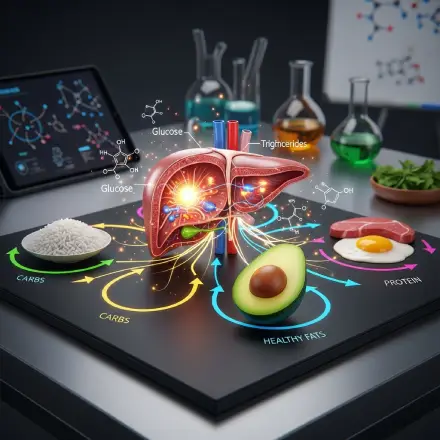
🧪 Here's what it does:
- 🍞🔋 Carbohydrates: [1]
- The liver converts glucose from digested carbohydrates into glycogen, a storable form of energy.
- Between meals, the liver breaks down glycogen to release glucose into the bloodstream, keeping blood sugar levels steady.
- This process prevents hypoglycemia (low blood sugar) and ensures a consistent energy supply throughout the day.
- Any excess glucose not used or stored as glycogen can be converted into fatty acids and stored as triglycerides for later use.
- 🥑🔥 Fats: [1]
- The liver breaks down fats into fatty acids and glycerol, which can be used to produce energy.
- When energy intake exceeds immediate needs, it stores fats as triglycerides, primarily in adipose tissue (body fat).
- These stored fats act as long-term energy reserves, ready to be mobilized during fasting, food scarcity, or times of high energy demand.
- 🍗🧱 Proteins: [1]
- The liver breaks down proteins into amino acids, which fuel everything from muscle growth to immune defense.
- The liver synthesizes non-essential amino acids and utilizes surplus amino acids for various functions like muscle growth and enzyme production.
- It also plays a key role in detoxification by processing ammonia, a toxic byproduct of protein metabolism.
- The liver converts ammonia into urea, which is then excreted by the kidneys.
But metabolism isn't just about breaking things down. It's also about building things back up. Your liver creates many of the essential compounds your body relies on, including cholesterol (yes, some cholesterol is good) and blood-clotting proteins that help you heal when you're injured.
🛡️ The Mighty Functions of a Healthy Liver
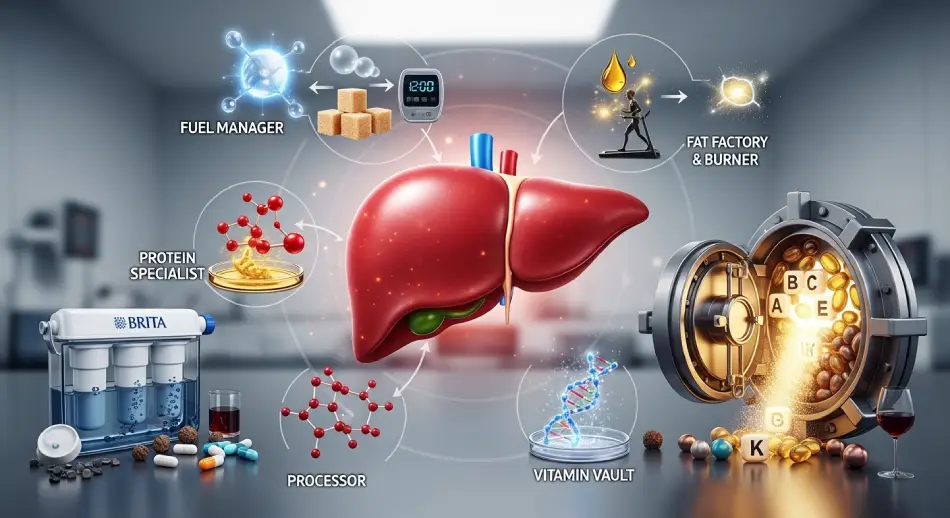
🧩 Let's break it down into five broad categories
- 🔋 Fuel Manager: [2]
- 🏭🔥 Fat Factory and Burner: [2]
- 🧬🔧 Protein Processor: [2]
- 🧼🚫 Detox Specialist: [3]
- 🗄️💊 Vitamin Vault: [4]
The liver works like a blood sugar thermostat. When glucose levels rise after a meal, it stores the excess as glycogen. When levels drop between meals, it releases that glycogen back into the bloodstream. This helps keep your energy steady and your body running smoothly.
The liver produces and stores fats, but it also burns them when your body needs fuel, especially during fasting or physical activity. It plays a central role in converting fat into usable energy and helps keep you powered when glucose runs low.
The liver breaks down amino acids from proteins and uses them for energy or to build new proteins that support growth, repair, and essential body functions.
Like your body's built-in Brita filter, the liver clears toxins, alcohol, medications, and pollutants from the bloodstream. It then packages the waste for safe removal, keeping your internal environment clean and balanced.
Your liver stores essential vitamins such as A, D, E, K and B12, along with minerals like iron and copper. When your body needs them, the liver releases these nutrients into the bloodstream to keep everything running smoothly.
🧬 How Your Liver Handles Fat
And What That Means for Weight Loss
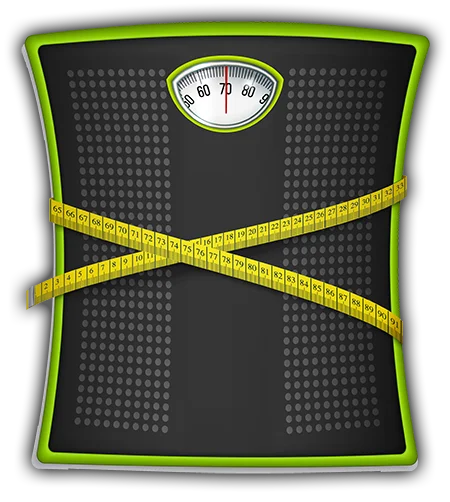
If your metabolism were an orchestra, the liver would be the conductor, especially when it comes to managing fat. Whether you're trimming down, boosting energy, or simply staying healthy, understanding how your liver processes fat is a game-changer.
Let's dig into the fat story, shall we?
🍽️ What Happens to Fats After You Eat Them?
🍽️ What Happens to Fats
After You Eat Them?
When you eat a meal that contains fats, such as avocado on toast or a drizzle of olive oil on your salad, your digestive system breaks those fats down into smaller molecules called fatty acids and glycerol.
These molecules get packaged into tiny transport particles called chylomicrons, which travel through your lymphatic system before entering your bloodstream.
Once in circulation, they travel to different parts of the body. Muscles use them for energy, fat tissue stores them for later, and yes, the liver steps in to process and regulate.
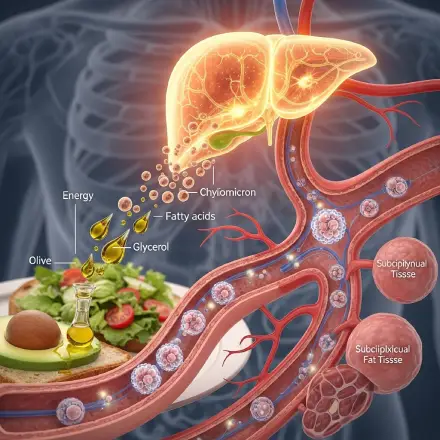
🧪 Inside the Liver: Fat Central
🧪 Inside the Liver:
Fat Central
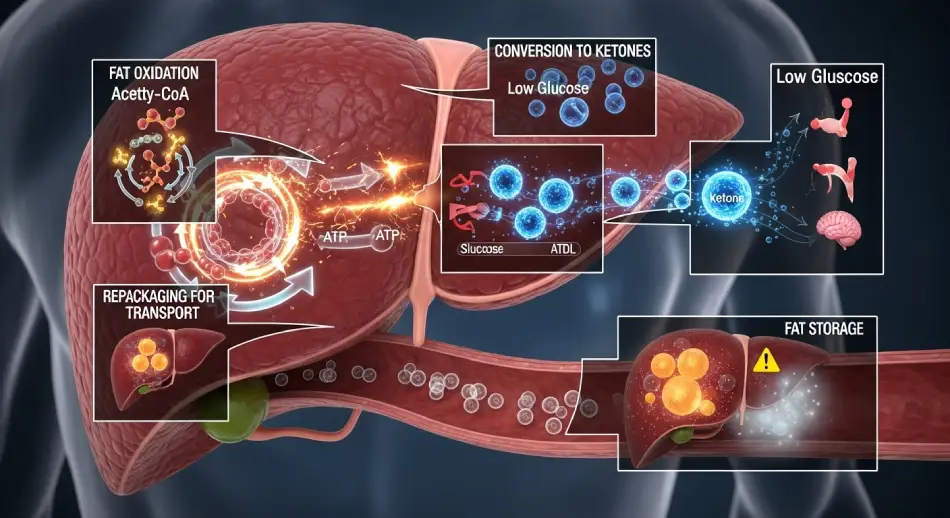
🧠 Once fats arrive at the liver, several cool things can happen:
- 🔥⚙️ Fat Oxidation (a.k.a. Fat Burning): [5]
- 🧠⚡ Conversion to Ketones: [5]
- 🚚🧪 Repackaging for Transport: [6]
- 🧴📦 Fat Storage (But Not Too Much!): [7]
Your liver breaks down fatty acids into smaller units called acetyl-CoA. These molecules enter the Krebs cycle to produce energy in the form of ATP. This process ramps up during fasting, exercise, or low-carb eating, when glucose is in short supply and fat becomes the body's preferred fuel.
When glucose levels are low, such as during fasting or a ketogenic diet, the liver converts fats into ketone bodies. These molecules serve as a highly efficient fuel source for both your brain and muscles, helping you stay energized when carbs are in short supply.
The liver can take in fat, modify it, and send it out to other tissues using molecules called VLDLs, or very-low-density lipoproteins. When this process goes into overdrive, it can lead to fatty buildup in blood vessels, increasing the risk of cardiovascular issues.
While most fat is stored in adipose tissue, some triglycerides can build up in the liver, especially if your diet is high in sugar and fat. Over time, this accumulation can lead to non-alcoholic fatty liver disease, a condition that disrupts metabolism and is best avoided.
🔥 Why This Matters for Fat Loss
Here's the kicker: a healthy liver burns fat more efficiently. But when it's overloaded with sugar, alcohol, stress or toxins, it struggles to keep up. You might feel tired, gain weight more easily around the belly, and find it hard to lose fat even if you're eating well and exercising.
Your liver is like a car engine. When it's clean, it runs faster, cleaner and more efficiently. But if it's gunked up with sludge, everything slows down.
🚨 Real-Life Signs Your Liver Might Be Struggling
These symptoms don't always point directly to liver trouble, but if several show up at once, it's worth paying attention.
If your liver isn't operating at full speed, your body will send signals.
👀 Watch for:
- Persistent fatigue
- Sugar cravings or unstable blood sugar
- Trouble losing weight, especially around the midsection
- Digestive issues like bloating or indigestion
- Skin breakouts or a dull complexion
- Brain fog or difficulty concentrating

⚙️ What Slows Down Liver Metabolism
And How to Fire It Back Up
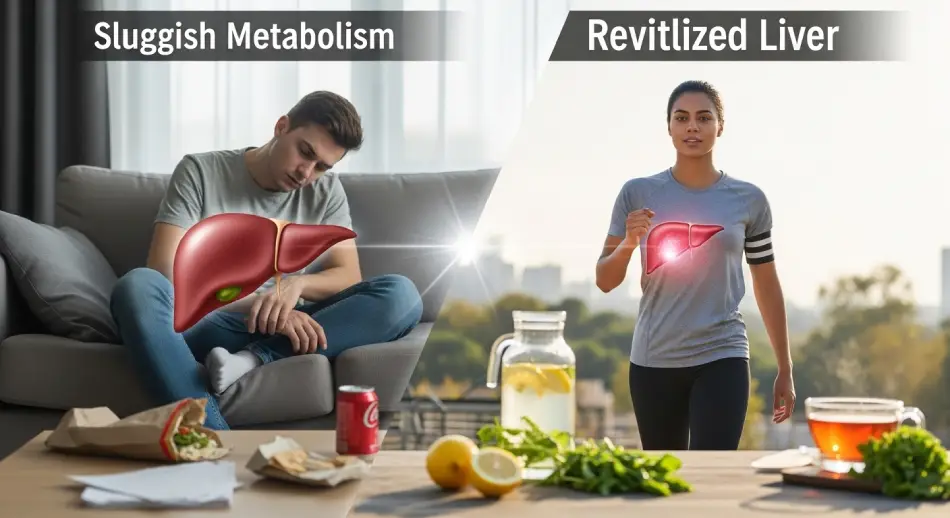
Your liver is a powerhouse. It works nonstop to metabolize fats, clear toxins, and keep your body in balance. But like any high-performing system, it can get bogged down. When that happens, your metabolism slows, your energy dips, and fat loss becomes frustratingly elusive. It can feel like nothing you're doing is working.
So what throws the liver off its game? And how do you help it bounce back?
🚫 Top Liver Offenders:
What Drains Your Detox Dynamo
🍰 1. Excess Sugar and Refined Carbs
High-fructose corn syrup, white bread, pastries are ultra-processed carbs that flood your system with glucose. This spikes insulin and triggers fat storage in the liver. Over time, it can lead to insulin resistance and pave the way for non-alcoholic fatty liver disease (NAFLD), a silent condition that affects millions and often goes unnoticed until damage is done.

🍷 2. Alcohol
Your liver treats alcohol like a top priority. As soon as it enters your system, everything else is put on hold, including fat metabolism and detoxification. Chronic drinking can lead to inflammation, fat buildup, and eventually liver scarring known as cirrhosis. Even moderate intake can slow down your liver's ability to process nutrients and clear toxins efficiently.

🧴 3. Toxins and Pollutants
From household cleaners and plastic containers to personal care products and air pollution, your liver faces a nonstop stream of foreign chemicals. It's designed to handle a certain load, but when exposure becomes chronic or excessive, detox pathways begin to slow. This can lead to toxin buildup, inflammation, and metabolic sluggishness. As a result, fat loss becomes more difficult and energy levels are harder to maintain.
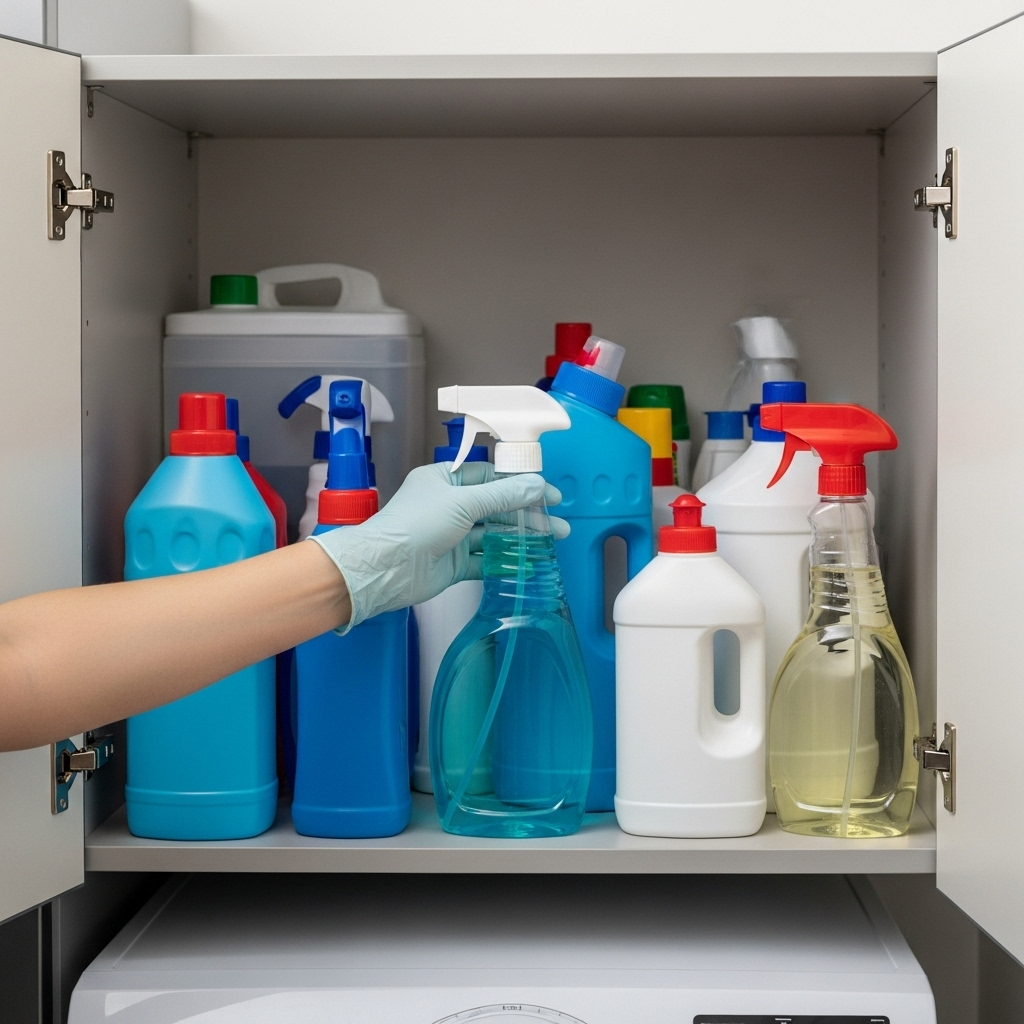

💊 4. Medications
Common over-the-counter drugs like acetaminophen (Tylenol) can put extra pressure on liver enzymes. Many prescription medications do the same. This doesn't mean you should avoid them when they're necessary, but it's worth being mindful of how often and how much you're taking. When the liver is busy processing pharmaceuticals, its ability to metabolize fats and clear toxins can slow down.
😰 5. Chronic Stress
When you're stressed, your body releases cortisol, the primary stress hormone. In the short term, it helps you stay alert and respond to challenges. But when stress becomes chronic, cortisol stays elevated. This can spike blood sugar, promote fat storage (especially around the belly), and suppress liver detox functions. Over time, it creates a metabolic environment that makes fat loss harder and energy levels harder to sustain.


🛋️ 6. Inactivity
Exercise helps regulate blood sugar, improve circulation, and mobilize stored fat. Without regular movement, the liver has to work harder to maintain metabolic balance. Over time, inactivity can slow detox pathways, increase fat accumulation, and reduce insulin sensitivity. These changes make it harder for the liver to function efficiently.
🔄 The Comeback Plan:
How to Revive a Sluggish Liver Naturally
Let's talk solutions, and good news, they're simple and sustainable.
🥗 Fill Your Plate with Liver-Friendly Foods
Nature knows what she's doing when it comes to liver health.
Try to include:
- Leafy greens (spinach, arugula, dandelion): help flush out toxins and support bile production.
- Cruciferous veggies (broccoli, cauliflower, Brussels sprouts): activate key detox enzymes in the liver.
- Citrus fruits (lemon, lime, grapefruit): rich in vitamin C and antioxidants that protect liver cells.
- Beets and carrots: boost bile flow and help reduce oxidative stres.
- Turmeric and ginger: calm inflammation and support digestion.
- Garlic and onions: contain sulfur compounds that enhance detox pathways.
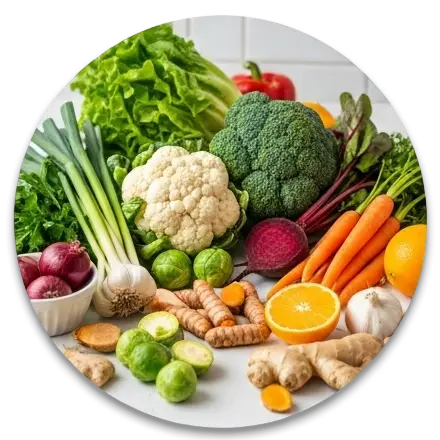
⚖️ Cut Back (Not Cut Out)
You don't need to live like a monk. Just aim to reduce the usual suspects that put pressure on your liver, starting with sugary drinks and desserts.
Sugary drinks and desserts:
- Excess sugar, especially fructose found in sodas and sweet treats, gets converted to fat in the liver.
- Over time, this can lead to fatty liver disease, even in people who aren't overweight.
- Try swapping soda for sparkling water with lemon or fruit-infused water. For a sweet fix, lean on fresh fruit instead of processed desserts.

🍞⚠️ White bread and highly processed snacks
- Highly refined carbohydrates such as white bread, crackers, and pastries cause rapid spikes in blood sugar and insulin levels. This surge not only places extra stress on the liver but also promotes fat accumulation within liver cells.
- By contrast, whole grains such as oats, brown rice, and whole wheat bread are rich in fiber. They help regulate digestion, stabilize blood sugar, and lighten the liver's workload, making them a smarter and more sustainable choice for long-term health.
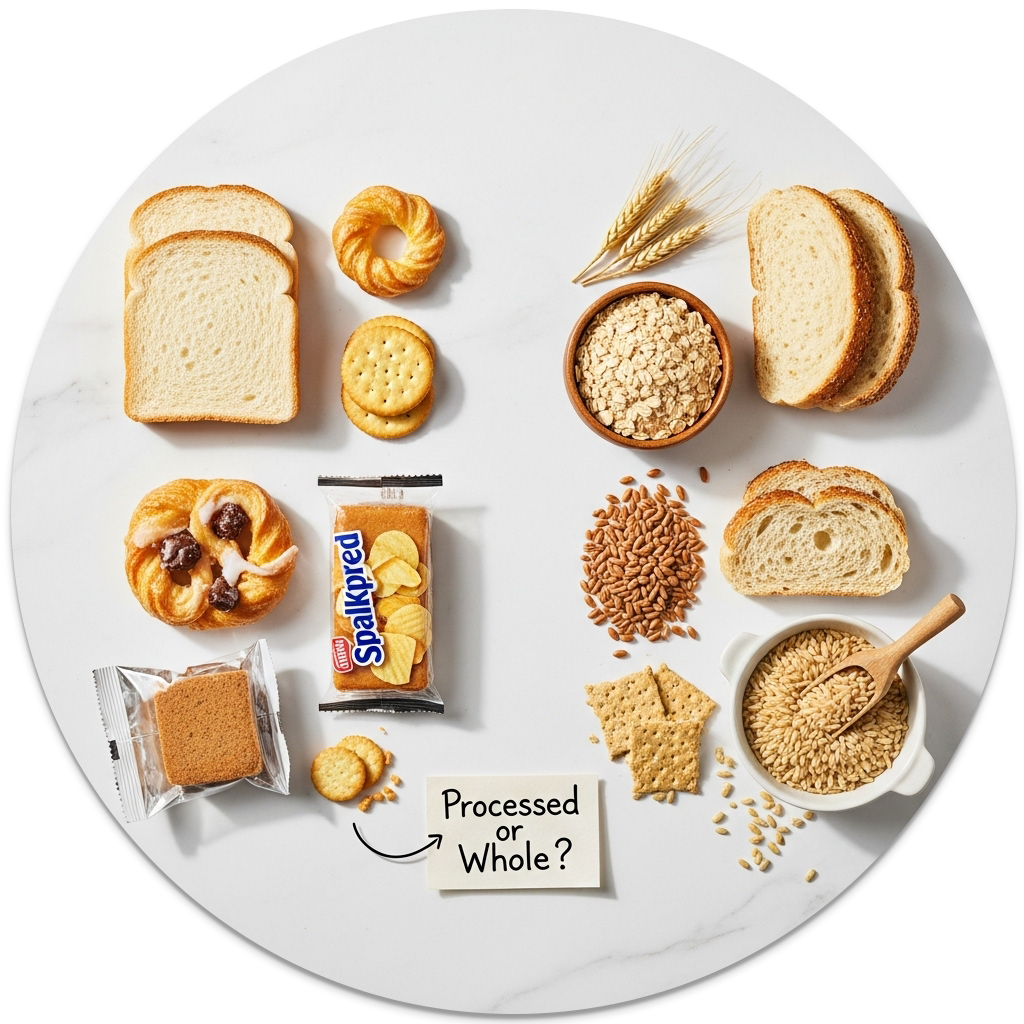
🍟🍔 Deep-fried or fast foods
- Deep-fried and fast foods are often loaded with trans fats, excess sodium, and artificial additives. These compounds can inflame liver tissue and interfere with its ability to filter toxins, regulate metabolism, and store nutrients effectively.
- A smarter alternative is to opt for home-cooked meals featuring lean proteins like grilled chicken or tofu, healthy fats such as olive oil or avocado, and a generous serving of colorful vegetables. These choices nourish the liver, reduce inflammation, and support long-term metabolic health.
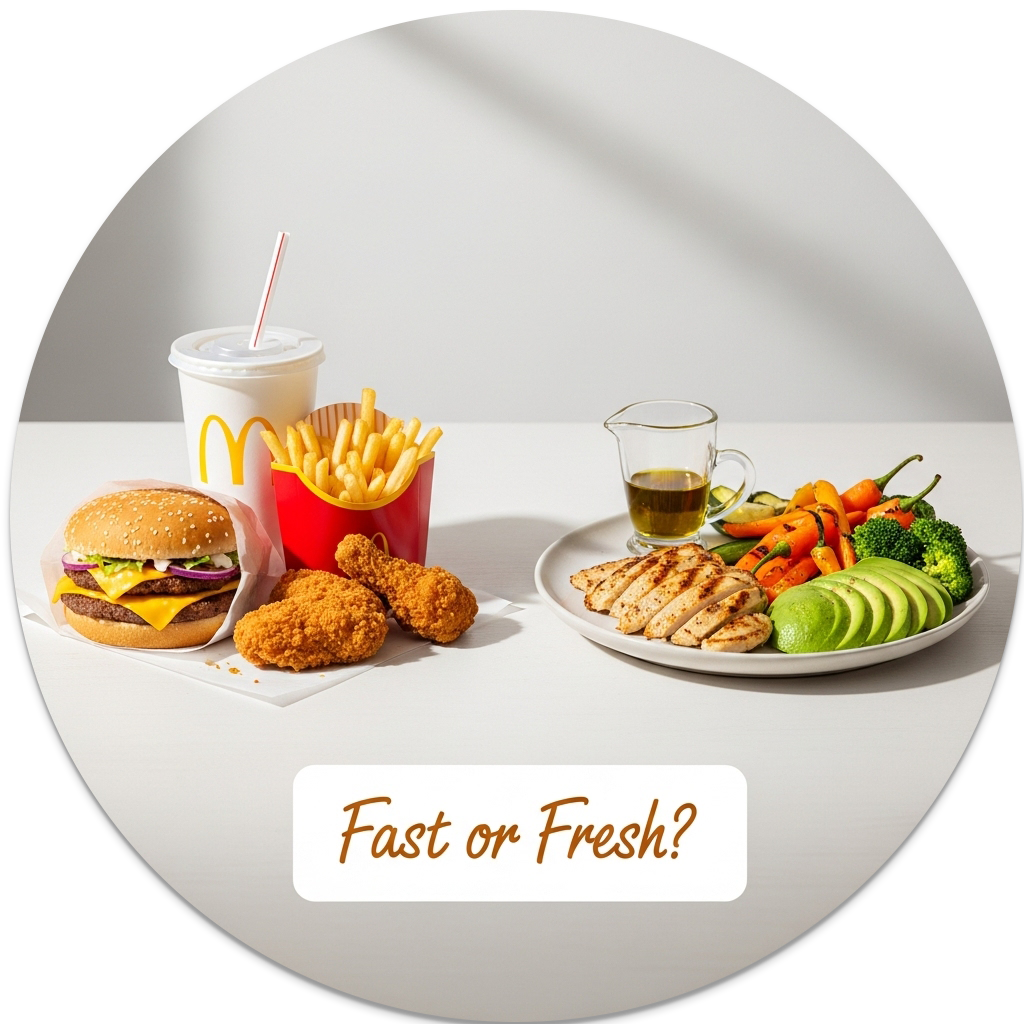
🍷🍺 Excessive alcohol
- Your liver is responsible for filtering alcohol, but excessive intake can overwhelm its capacity. Over time, this can lead to inflammation, fatty liver, and even permanent scarring known as cirrhosis.
- You don't necessarily need to eliminate alcohol completely. Instead, aim for moderation by incorporating alcohol-free days during the week or setting a reasonable weekly limit. These small shifts can make a big difference in preserving liver function and supporting overall metabolic health.
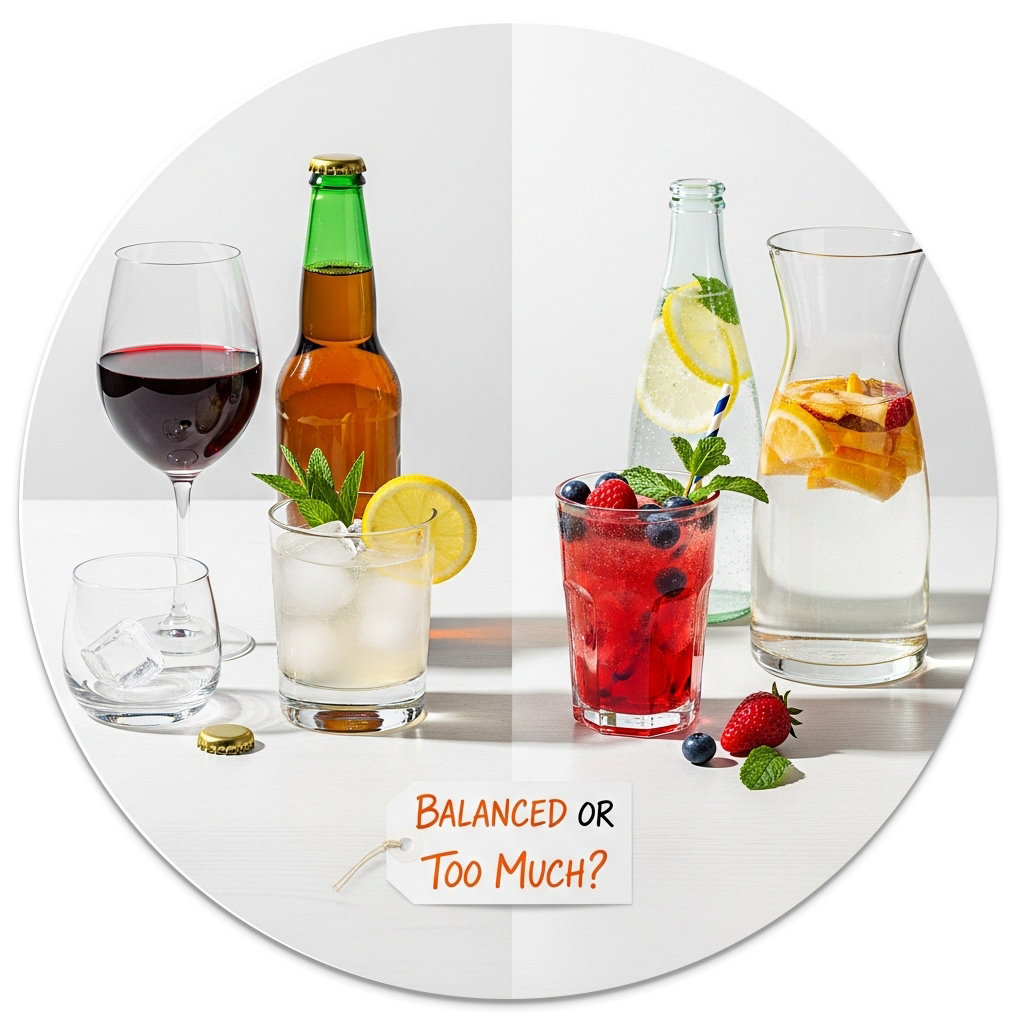
💧 Stay Hydrated
- Your liver is essentially the body's built-in cleanup crew, but like any effective detox team, it can't do its job properly without enough water. Hydration is more than just quenching thirst; it's about providing the fluid flow your liver needs to process toxins, move metabolic waste, and deliver nutrients where they belong.
- If you're waiting until you feel thirsty, your body is already playing catch-up. Instead, think of sipping water as fueling a steady internal river that keeps your liver running clear, smooth, and strong.

🛌 Prioritize Sleep and Stress Management
- Sleep is when your liver performs much of its internal “housekeeping,” repairing cells and processing metabolic waste. A lack of rest can disrupt these vital functions and throw your entire system off balance.
- Aim for 7 to 9 hours of quality sleep each night, and support your recovery with calming routines. Gentle walks, journaling for self-reflection, meditation, and deep breathing exercises can help lower stress levels and reduce inflammation, giving your liver the space it needs to thrive.
- 🛏️⏰ With all this in mind, it's helpful to review the sleep needs across different age groups. Understanding how these requirements evolve over time can give you better insight into your own changing sleep patterns.

🤸♀️ Move Your Body
- You don't need a personal trainer shouting in your ear or a CrossFit badge to give your liver the care it deserves. When it comes to liver health, gentle and consistent movement often does more good than intense but sporadic workouts.
- Even five to ten minutes here and there adds up. Movement doesn't need to be scheduled; it just needs to be part of your day. The liver doesn't care what shoes you're wearing or whether you hit your step goal. It simply thrives in a body that stays in motion.

🛏️⏰ With all this in mind, it's helpful to review the sleep needs across different age groups. Understanding how these requirements evolve over time can give you better insight into your own changing sleep patterns.
| Age group | Age range | Recommended hours of sleep |
|---|---|---|
| Newborns | 0-3 months | 14-17 hours per day (including naps) |
| Infants | 4-11 months | 12-15 hours per day (including naps) |
| Toddler | 1-2 years | 11-14 hours per day (including naps) |
| Preschoolers | 3-5 years | 10-13 hours per day (including naps) |
| School-age | 6-13 years | 9-11 hours per night |
| Teenagers | 14-17 years | 8-10 hours per night |
| Adults | 18-64 years | 7-9 hours per night |
| Older adults | 65 years and older | 7-8 hours per night |
🌿 Daily Liver-Boosting Habits
And ✨ Easy Lifestyle Upgrades

You don't need to overhaul your entire life to support your liver. Most of the habits that nourish this vital organ are gentle, repeatable, and surprisingly simple. The magic is in the consistency. Just a few small actions each day can help your liver stay sharp, smooth, and strong.
Let's break it down, step by step.
🌞 Start Your Day Liver-First
Mornings are a golden opportunity to kickstart your detox pathways and set your metabolism up for success.
Try this mini-morning ritual:
🍋 Hydrate with Warm Lemon Water:
- Why it works: After a night of sleep, your body wakes up mildly dehydrated. Warm lemon water helps replenish fluids and gives your liver a gentle nudge to start the day.
- Added bonus: The citric acid in lemon may stimulate bile production, which is essential for digestion and detoxification.
- Pro tip: Squeeze half a fresh lemon into a warm glass of water and sip slowly before breakfast. It's a small ritual with a big ripple effect.
🚶♂️ Get Moving, Even Just a Little:
- What to do: Gentle movement such as stretching, yoga, or a brisk 5 to 10 minute walk can jump-start your circulation and help your body shake off sleep.
- Liver benefit: Physical activity moves lymphatic fluid, increases oxygen flow, and wakes up your digestive system. All of this supports your detox organs, especially the liver.
- Keep it light: This isn't about intense workouts. It's about waking up your metabolism and easing into the day with less stiffness and more flow.
🥑 Skip the Sugar Bomb Breakfast:
- Avoid: Highly processed cereals, muffins, and pastries that spike blood sugar and push your liver into overdrive.
- Choose instead:
- Eggs with sautéed greens like spinach, kale, or dandelion are all friends to your liver.
- Avocado toast on whole grain or sprouted bread, topped with hemp or chia seeds.
- Smoothies with fiber (flax or chia), antioxidants (berries), greens (spinach or kale), and healthy fats (nut butter or avocado).
- Why it matters: A steady supply of fiber, healthy fats, and protein helps keep insulin levels balanced. That means less stress on your liver and more support for its natural detox and metabolic functions.
💧 Lifestyle Habits That Support Your Liver Daily
Let's talk habits, the little things that quietly add up:
- Stay hydrated throughout the day. Aim for 2 to 3 liters of water to keep your liver's filtration system running smoothly.
- Take outdoor breaks. Fresh air and natural light help regulate hormonal rhythms and support your liver's internal clock.
- Limit late-night snacking. When digestion winds down, your liver can focus on detoxing instead of processing food.
- Try dry brushing or sauna sessions. If accessible, these practices support lymphatic drainage, which is your body's secondary detox system.
- Establish a bedtime routine. Quality sleep is non-negotiable. Your liver does its deepest cleanup while you rest.
🔁 Small Swaps, Big Wins
No need for perfection. Try these easy tweaks:
- Replace soda with sparkling water and fresh citrus slices for a refreshing, liver-friendly upgrade.
- Cook with olive or avocado oil instead of processed seed oils to reduce inflammation and support metabolic health.
- Swap microwave meals for batch-cooked stir-fries or soups packed with fiber, nutrients, and whole ingredients.
- Trade one night of takeout for a homemade sheet pan dinner with lean protein and colorful veggies. It's simple, satisfying, and liver-loving.
🌟 Big Picture Liver Wisdom:
Signs It's Working for You
By now, you've probably realized your liver isn't just that organ that gets mad at alcohol. It's more like your body's backstage crew, quietly running the show so you can step out and shine.
From energy levels and digestion to hormone balance and fat-burning potential, your liver acts as a central command center for feeling your best.
So what happens when it's truly thriving? Let's explore the signs of optimal liver function, and how to stay on track for the long haul.
Signs Your Liver (and Metabolism) Are Thriving
Once you've been consistently supporting your liver, even for just a couple of weeks, you may begin to notice subtle but powerful shifts. These changes are your body's way of saying, 'Thank you.'
You might start to feel:
- ⚡ Steadier energy from morning to night, without the caffeine rollercoaster or that 3 p.m. brain fog.
- 🍽️ Smoother digestion and less bloating, as bile flow improves and enzymes do their job more efficiently.
- ✨ Clearer, more radiant skin as your body becomes more efficient at filtering out toxins and waste.
- 🍬 Fewer cravings, and mental clarity, as brain fog fades and your system clears out the clutter.
- 🧠 Sharper focus and mental clarity, brain fog lifts when toxins are cleared efficiently.
- 🔥 Noticeable fat loss, especially around the midsection, as your liver ramps up its fat-burning efficiency.
- 😊 Brighter mood, as hormone balance improves and your liver lightens the emotional load.
These shifts may start subtly, but with consistency, they build momentum and lead to a full-body transformation that feels as good as it looks.
🌱 Progress Without Perfection:
Sustainability Is Key
The best part is, you don’t need to be perfect. In fact, chasing perfection can backfire when it comes to wellness
💚 What your liver loves most is steady, sustainable support:
- 🎂 A slice of cake at a birthday party is part of living well and nothing to stress over.
- 😴 A skipped workout or a late night is no setback. Your body knows how to bounce back.
- 🍟 A few fries off someone's plate won't throw you off track because your liver has bigger things to focus on.
✅ The goal is consistency, not rigidity. Create habits you enjoy, meals that nourish, movement that energizes, and sleep that deeply restores.
Your Liver, Year-Round
It's common to hear about “doing a liver detox” once or twice a year, yet your liver works hard every single day.
Instead of relying on one-off resets, the real magic lies in everyday liver love:
- 🌿 Seasonal eating: Embrace what's fresh and local—from the tender greens of spring to the earthy comfort of fall squash. Let your plate reflect the rhythm of the land: juicy berries in summer, hearty roots in winter. Eating with the seasons is good for your liver, and it's also a way of syncing with nature's wisdom one bite at a time.
- 🔄 Routine check-ins: Notice how your energy, digestion, and cravings shift in response to different foods, habits, or even moods. These subtle signals are your body's way of communicating what's working and what's asking for attention. A simple pause after a meal or a quiet moment before bed can reveal patterns that help you nourish yourself with more intention and ease.
- 🧠 Curiosity over guilt: If you go off track, skip the self-blame and lean into curiosity. What shifted in your day, your mood, or your environment? What was your body asking for in that moment? Every slip holds a clue, and every clue is a chance to pivot with more compassion and clarity.
The more you tune into your body's rhythms, the more naturally these habits take root. Your liver responds in quiet but powerful ways like clearer skin, steadier energy, and smoother digestion. It's not just something you feel; it's something you live.
🧪 🧠 Final Takeaway: It's All Connected
🧠 Final Takeaway:
It's All Connected
Supporting liver metabolism isn't just about weight loss or detox. It's about:
- Honoring your body's natural intelligence means listening before fixing and observing before reacting. It's trusting that your body knows how to heal, digest, rest, and renew when given the space and support to do so. This isn't about control. It's about collaboration. You're not the boss of your body; you're its partner.
- Reclaiming energy and clarity means coming back to your baseline, where your mind feels clear, your body feels steady, and your days feel more spacious. It's not about chasing peak performance. It's about restoring the kind of vitality that lets you move through life with ease, focus, and presence.
- Building a lifestyle that nourishes you inside and out means creating daily rhythms that support your physical health, emotional clarity, and mental ease. It's choosing foods that energize, movement that restores, and habits that feel sustainable. This isn't about perfection. It's about consistency, intention, and the quiet power of showing up for yourself day after day.
When your liver is humming along, everything else works better. Your hormones, your digestion, your brain, and even your immune system begin to find their rhythm. This isn't about quick fixes. It's about deep, steady transformation that starts within and radiates outward.